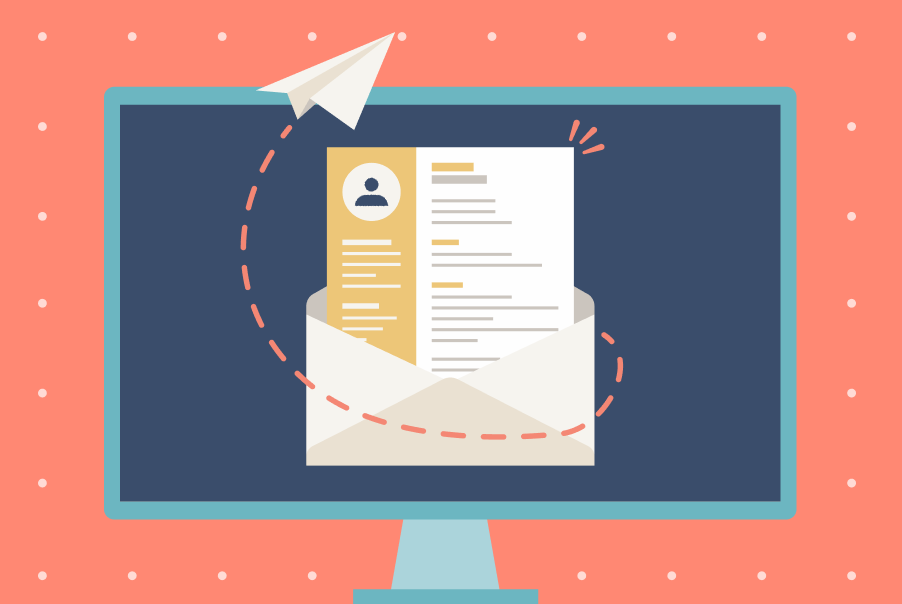Our customers have been hired at: *Foot Note
Table of Contents
Get started with MyPerfectResume today!
- Build a resume on any device
- Pick an ATS-friendly template
- Tailor with AI copy suggestions
In a competitive hiring climate, following up on a job application can set you apart from other candidates and improve your chances of securing an interview.
In this guide, we’ll cover how to follow up on a job application, including when to reach out, which communication method to use, and how to structure your message.
Browse our job application follow-up templates and examples, and explore key tips for standing out to recruiters and improving your chances of securing an interview.
How to Follow Up After Applying for a Job
With the right timing and tone, following up on a job application can show initiative and enthusiasm. Explore the steps below to learn how and when to follow up on a job application.
Wait one to two weeks
Wait one to two weeks after applying before following up. This gives the hiring manager time to review applications and increases the chances that they will have information to share with you.
Before you follow up, double-check the job listing. Some include a closing date or request no follow-ups. If there’s a deadline, wait a few days after that date to reach out.
Aim to follow up midweek—Tuesday through Thursday. Avoid Mondays (when inboxes are backed up) and Fridays (when hiring teams may be wrapping up for the week).
Contact the right person
When you're following up on a job application, contacting the right person is important to ensure your inquiry is handled efficiently and positively. Here are some guidelines to follow:
- Hiring manager: If you know the hiring manager's name, they are typically the best person to contact. This individual is directly involved in the hiring decision and will have the most relevant information regarding your application status.
- Recruiter: If your initial communication was with a recruiter, following up with them is appropriate. Recruiters can provide updates and might also offer additional insights into the hiring timeline.
- Human resources (HR) department: If you applied through an HR department and haven’t had direct contact with a specific person, you can follow up with the general HR contact. This could be via an email address or phone number provided in the job listing.
- Referral or internal contact: If you were referred by someone within the company, you could ask this person for advice on how to proceed with your follow-up. They might offer to check on your behalf or provide you with direct contact details.
- Company contact information: If you can’t find a specific contact or if no names were provided in the job listing, use the general contact information listed on the company’s website. This might direct you to a contact who can then route your inquiry accordingly.
Choose your communication method
Choosing the right communication method to follow up after a job interview is crucial for making a good impression. Below are a few of the primary communication methods to consider.
Email is often the preferred method for following up because it’s professional, gives the recipient time to respond at their convenience, and allows you to craft a thoughtful message.
Phone call
A phone call can be more personal and immediate. It might be appropriate if you have developed a rapport with the hiring manager or if they have encouraged you to call.
Professional networking platform
If you connect with the interviewer on a professional networking platform, sending a brief message can be a viable alternative. However, more formal channels are typically preferred.
If you are applying for additional roles, we recommend exploring our library of resume examples for samples tailored to various industries and roles.
Craft your follow-up message
Include your name, the position you applied for, and any application reference numbers to help the person you're contacting quickly locate your application and provide you with an update.
Explore the steps and examples below to learn how to craft an effective follow-up message.
How to Follow Up on a Job Application by Email
Following up on a job application via email is a professional way to express your continued interest in the position and keep your application on the radar of hiring managers.
Explore the essential components below to start crafting your message. See our guide on how to write a resume to continue perfecting your job applications while you wait for a response.
Write a clear subject line
Keep the subject line clear and direct. Include your full name and the position you applied for, making it easy for the recipient to identify the purpose of your email.
Introduce yourself
Address the recipient by name if you know it. If not, a general greeting like "Dear Hiring Manager" is appropriate.
Start by reintroducing yourself and stating the purpose of your email. Mention the position you applied for, the date of your application, and any other relevant details.
Dear Mr. Carter,
I hope this message finds you well. I am writing to follow up on my application for the Marketing Manager position, submitted on August 1st.
Express your enthusiasm
Briefly reiterate your interest in the role and why you believe your skills and experience make you a great fit for the position and company.
Politely request an update
Ask politely for any updates regarding your application status and express your eagerness to proceed to the next steps.
Include a professional sign-off
Thank them for considering your application and their time. Mention that you look forward to the possibility of discussing the role further. End with a professional closing and your full name.
Thank you for considering my application. I look forward to the opportunity to discuss how I can contribute to your team and help GreenWorks achieve its goals.
Best regards,
John Doe
Job Application Follow-Up Email Templates
You can use the templates below to craft a professional and effective email to follow up on a job application that you submitted within the past one to two weeks.
Professional and courteous
Subject: Following Up on [Job Title] Application – [Your Name]
Dear [Hiring Manager’s Name],
I hope you're doing well. I wanted to follow up on my application for the [Job Title] position I submitted on [Date]. I remain very interested in the opportunity to contribute to [Company Name] and bring my [Key Skill or Experience] to your team.
Please let me know if there's any additional information I can provide. I look forward to the possibility of speaking with you.
Thank you for your time and consideration.
Best regards,
[Your Name]
[Your Phone Number]
[Your LinkedIn Profile or Portfolio Link]
Detailed and thoughtful
Subject: Inquiry on Application Status – [Your Name] – [Job Title]
Dear [Hiring Manager’s Name],
I hope this message finds you well. My name is [Full Name], and I recently applied for the [Job Title] position on [Application Date]. I am writing to kindly inquire about the selection process's progress and express my continued interest in joining [Company Name].
With a background in [Your Field/Industry] and hands-on experience in [Relevant Experience], I am enthusiastic about the opportunity to contribute to your team, especially given your recent [mention any relevant company initiative or project that excites you].
I understand the challenges involved in finding the right candidate and appreciate the time and effort that goes into this process. Please let me know if you need any further details or documents from my side to facilitate the decision-making.
Thank you for considering my application. I am looking forward to the possibility of contributing to [Company Name] and am eager to bring my skills in [Key Skills] to the [Department] team.
Best regards,
[Your Full Name][Your Contact Information]
Enthusiastic and friendly
Subject: Excited to Follow Up – [Job Title] Application
Dear [Hiring Manager’s Name],
I hope you're having a great week! I wanted to check in on my application for the [Job Title] position. I'm still very excited about the role and the chance to be a part of [Company Name]—especially after learning more about [something specific about the company or role that caught your interest].
If there are any updates on the hiring timeline, I’d love to hear them. Please let me know if there’s anything else you need from me in the meantime.
Thanks again, and I hope to connect soon!
Best,
[Your Name]
Short and polite
Subject: Following Up on My Application
Dear [Hiring Manager’s Name],
I am reaching out to follow up on my application for the [Job Title] role, which I submitted on [Date]. I’m still very interested in the opportunity and would love to learn more about the next steps if possible.
Thank you again for your time and consideration.
Sincerely,
[Your Name]
How to Follow Up on a Job Application by Phone
Hiring managers generally prefer to follow up on a job application by email, as it provides a written record of your conversation and allows them to respond at a convenient time.
However, in some contexts, a phone call can be an effective method of communication. Here are a few scenarios when a phone conversation might be appropriate for following up:
- Clarification needed: If there are complex issues to clarify that might be too cumbersome to explain in writing, a phone call can be a direct way to discuss them.
- Follow-up to previous communication: If a previous email has gone unanswered for an unusually long time, a phone call can ensure your application wasn't overlooked.
- Cultural or industry norms: In some industries or cultures, phone calls might be more expected or customary than in others, such as small businesses or startups.
Prepare and choose the right time
Before the call, prepare a brief script or outline of what you want to say. This should include a greeting, your introduction, the purpose of the call, and any questions.
Knowing what to say beforehand can help you feel confident when they pick up the phone.
It can also help you have a succinct message prepared to share in case you reach a receptionist or you’re sent to voicemail. For example:
"Hello, this is [Your Full Name]. I applied for the [Job Title] on [Application Date] and was hoping to speak with [Hiring Manager’s Name] to follow up on my application.
I am very interested in the opportunity to contribute to [Company Name] and would appreciate any updates you could share regarding the hiring process.
I can be reached at [Your Phone Number] or via email at [Your Email Address]. Thank you for your time, and I hope to hear from you soon."
Always consider the business hours of the company's time zone. Time your call for mid-morning or mid-afternoon, avoiding Mondays and Fridays.
State the purpose of your call
Start by introducing yourself. Mention your full name, the job title you applied for, and when you submitted your application. This helps the hiring manager quickly recall or find your details.
Clearly express that you are calling to follow up on your application and express your continued interest in the position.
Thank the recipient for their time
Whether you speak to a person or leave a voicemail, always end your call by thanking them for their time and consideration.
Use one of our professional resume templates to quickly and easily craft a resume that showcases your unique skills and qualifications, increasing your chances of landing an interview.
How to Follow Up on a Job Application on LinkedIn
LinkedIn can be a powerful way to follow up on a job application. It shows initiative, professionalism, and genuine interest in the role. Here’s when it’s appropriate and effective:
- No follow-up restrictions: If the job posting doesn’t mention “no calls or emails,” it’s typically acceptable to follow up on LinkedIn.
- You’ve identified the right contact: You can find the hiring manager, recruiter, or department lead on LinkedIn—someone who’s likely involved in the hiring process.
- You’re not doubling up messages: You haven’t already sent a follow-up via email and LinkedIn simultaneously, which could come off as overly persistent or pushy.
Send a connection request with a brief note
Look for a recruiter, hiring manager, or team lead at the company who’s likely involved in the hiring process. If you're not already connected, send a polite message along with your request.
Keep your message short and professional, for example:
Hi [Name], I recently applied for the [Job Title] role at [Company Name] and would love to connect. Looking forward to learning more about your team and the opportunity.
Wait until your request is accepted
Once they accept your connection, follow up with a short, thoughtful message. Keep the tone polite and enthusiastic:
Avoid casual language, emojis, or overly personal comments. Treat it like a brief cover letter in message form: focused, relevant, and courteous.
Tips for Following Up on a Job Application
- Proofread your follow-up: Before sending an email or making a call, double-check your message for any spelling or grammatical errors. A clean and error-free follow-up reflects your attention to detail and professionalism.
- Be concise and professional: Keep your communication brief and to the point. Ensure your tone is polite and professional. You want to come across as enthusiastic and interested without being overbearing.
- Prepare for different responses: Be ready for any response, from an immediate update to a note that the process is still ongoing. Whatever the feedback, respond graciously and thank the person for the update.
What to Do if You Don’t Get a Response
After your follow-up, allow some time for a response. Depending on the company's hiring process, it may take a few weeks to hear back. Patience is crucial during this period.
Focus on other opportunities
While you wait for a response, continue applying for other opportunities. Keeping your momentum going helps reduce stress and increases your chances of landing something great.
Consider any areas that you’d like to improve or adjust for future applications. Take the opportunity to review your resume, cover letter, and interview skills.
Use the experience to strengthen your approach for the next application. To craft a compelling cover letter that complements your resume, we recommend using our Cover Letter Generator.
Avoid following up again
Avoid sending a second follow-up email for a job application after no response. Persistence is good, but too many follow-ups can work against you.
Silence doesn’t always mean rejection. Hiring processes can take longer than expected, especially if the company is managing multiple roles or coordinating across teams.
Network for additional insight
If you have contacts within the company, you might consider reaching out to them for insight into the hiring process.
Sometimes, internal employees can offer valuable context or even expedite feedback on your application.
If you do eventually hear back, even if it’s a no, reply with gratitude. Professionalism leaves the door open for future opportunities with the company.
Common Mistakes to Avoid When Following Up
- Following up too soon: Wait at least one to two weeks after submitting your application before following up for the first time.
- Using an overly casual tone: Maintaining professionalism in your communication is crucial. Avoid colloquial language or overly casual phrases.
- Not personalizing your message: If possible, address the hiring manager by name and reference specific details about the job to demonstrate your interest.
- Forgetting to check spelling and grammar: Always proofread your messages before sending them to ensure they are free of spelling and grammatical mistakes.
- Disregarding instructions: If the job listing specifically says not to follow up, it is important to respect that request.
- Pressuring for a response: While asking for an update is acceptable, avoid language that demands an immediate response or puts undue pressure on the recipient.
Explore the best resume formats for tips on crafting a resume that aligns with your career goals and professional history.
Make a Resume With Our Resume Builder
The first step in the job application process is crafting a resume that effectively showcases your skills and qualifications.
You can use our professional AI Resume Builder to quickly and easily make a resume that wins interviews. The sample below exemplifies what an effective resume looks like.
You can use our ATS Resume Checker to scan your resume and get improvement suggestions to increase your chances of impressing hiring managers and securing an interview.
Key Takeaways
- Follow up one to two weeks after submitting your application. This shows your interest without being overbearing.
- Whether you choose to follow up by email, LinkedIn, or phone, keep your communication brief, polite, and professional.
- If the job posting requests no follow-ups, respect that instruction. Overstepping could negatively impact your application.
- Following up can help you build a connection with the hiring manager or recruiter, which can be beneficial regardless of whether you get the job.
FAQ
Should you follow up on a job application?
If the job listing doesn’t specify to avoid follow-ups, then yes, you should follow up on your job application. Following up on a job application can demonstrate your interest in the position and keep you on the hiring manager’s radar.
Wait one to two weeks after submitting your application before following up. Reiterate your interest in the position and politely ask for any updates regarding the hiring process.
Checking in on your application can differentiate you from other candidates who don’t take that extra step, but it’s crucial to do it thoughtfully to ensure you’re making a positive impression.
See how to write a follow-up email after an interview to prepare for the next steps.
How long should you wait to follow up on a job application?
The ideal time to wait before following up on a job application is typically about one to two weeks after submitting your application.
This time frame allows the hiring manager or recruiter sufficient time to review applications without feeling rushed or pressured.
While you wait, browse our library of cover letter examples to craft a job-winning application tailored to your target role.
Can you follow up on a job application in person?
Following up on a job application in person can be effective in certain situations, but it often requires careful consideration of the context and company culture.
If you’ve applied for a position in a retail store, restaurant, or similar setting, dropping by in person might be seen as proactive and a good way to show your enthusiasm.
Here are a few tips on how to follow up on a job application in person:
- Dress appropriately: Make sure you’re dressed professionally or in a manner that aligns with the company’s dress code.
- Prepare a brief message: Have a clear and concise statement ready about who you are, the position you applied for, and why you’re following up.
- Bring a copy of your resume: Have a copy of your resume on hand to give to a manager or the person in charge.
- Be respectful of time: Acknowledge that you understand they’re busy. Ask if it’s a good time to talk, or if you should come back at a more convenient time.
Be attentive to the reactions you receive. If the staff seems busy or the manager appears uninterested, keep the visit brief and professional.
How do you politely follow up on a job application?
Polite follow-up shows your professionalism and reinforces your interest in the position, helping you stand out as a thoughtful and persistent candidate.
Your email or phone call should maintain a professional tone throughout. Use formal language and be courteous in your communication.
Clearly express your enthusiasm for the role and the company. Mention a specific aspect of the job or company culture that particularly appeals to you to show genuine interest.
Request an update on the status of your application politely. Frame it as a request for information rather than a demand.
How We Reviewed this Article
Since 2012, we have helped more than 11 million job seekers. We want to make your career journey accessible and manageable through our services and Career Center’s how-to guides and tips. In our commitment to bring you a transparent process, we present our Editorial Process.
Our customers have been hired at:*Foot Note










